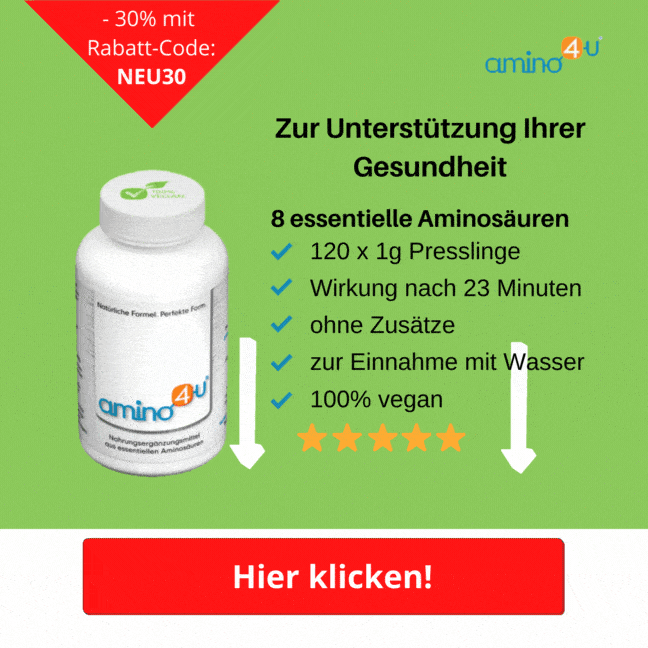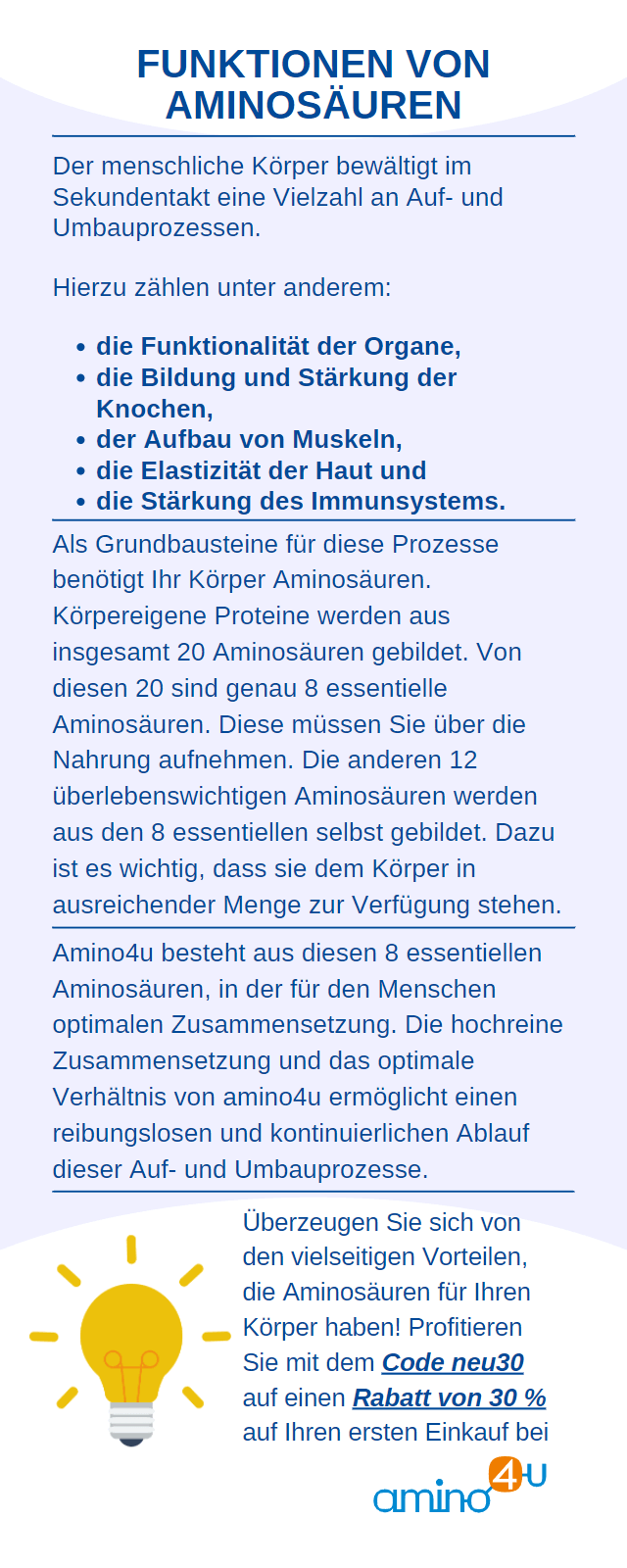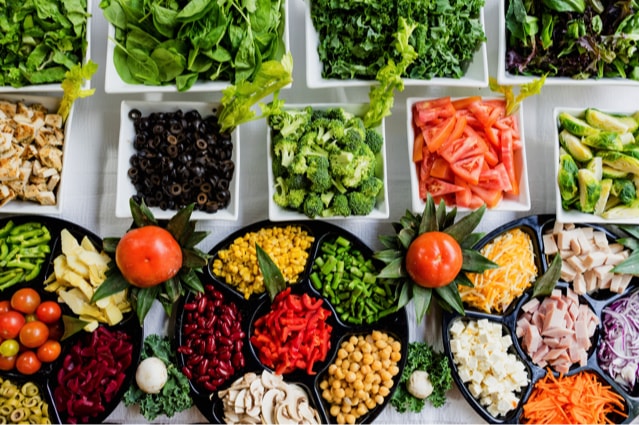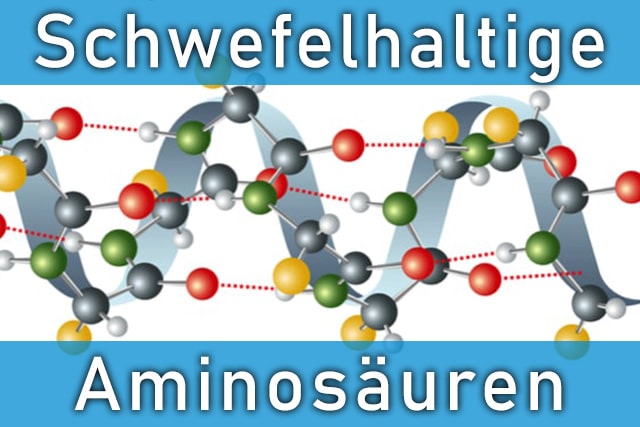Proteins are one of the most important building blocks of the human body and take on many functions. They are in every cell and ensure the structure of the skin, connective tissue and muscles. They regulate the transport of oxygen and nutrients in the cells and strengthen our immune system. A problem-free energy and structural metabolism would hardly be possible without certain enzyme proteins, which act as biological catalysts, so to speak. A protein itself consists of a combination of amino acids, variants of which are found in all living things.
Amino acids - which ones are there?
An amino acid is a chemical compound with two functional groups. The amino group contains nitrogen and hydrogen, the
carboxy group contains carbon, oxygen and hydrogen in different compositions. For us humans,
20 amino acids are particularly interesting, although far more variants occur in nature. They are also called
proteinogenic amino acids (= “
tissue-forming ”).
 The 20 protein building blocks are in alphabetical order:
The 20 protein building blocks are in alphabetical order:
- Alanine
- Arginine
- Asparagine
- Aspartic acid
- Cysteine
- Glutamine
- Glutamic acid
- Glycine
- histidine
- Isoleucine
- Leucine
- Lysine
- Methionine
- Phenylalanine
- Proline
- Serine
- Threonine
- Tryptophan
- Tyrosine
- Valine
Division of protein building blocks into three classes
The 20 acids mentioned are divided into three classes based on chemical principles and their importance for our nutritional physiology: In essential, semi-essential and non-essential amino acids. We would like to briefly describe the differences to you.
-
Essential aminos
There are 8
essential amino acids that our body cannot produce itself:
- Leucine
- Isoleucine
- Valine
- Lysine
- Threonine
- Phenylalanine
- Methionine
- and tryptophan
Therefore, we must necessarily consume them through food or through appropriate
amino acid supplements . They are primarily responsible for building muscles, in which non-essential protein building blocks, for example, hardly play a role.

-
Semi-essential aminos
Under optimal health conditions, the human organism can produce
semi-essential amino acids from the essential ones. However, production decreases with adverse factors such as stress, growth phases or serious illnesses. In such cases, we therefore have to consume more of them with our food.
-
Non-essential aminos
With a balanced diet and other healthy lifestyle, the body produces sufficient quantities
of non-essential amino acids . So they don't have to enter the body through food.
How do amino acids in food become the body's own proteins?
We need
amino acids to build the body's own protein building blocks. In order to obtain an amino acid from the proteins in food, several steps must be completed. The food protein is broken down and broken down in the intestinal tract by enzymes. The released acids then reach the liver via the bloodstream. There they are then available to the organism for the formation of the body's own proteins.
What is the Amino Acid Pool?
In contrast to fats and carbohydrates, we humans cannot store proteins directly. Only a certain portion of freely available amino acid can be stored in the so-called
amino acid pool . This means that we must constantly consume amino acids with meals if we want to prevent the breakdown of the body's own protein. As soon as we consume more protein than our metabolism needs, the excess amino acids go into the pool after digestion. If this is already filled, the acids are used to generate energy. The nitrogen contained in it is largely excreted in the urine.
How high is the amino acid requirement?
The
World Health Organization (WHO) recommends a daily intake of around 184 mg per kilogram of body weight through a balanced diet. For a person weighing 80 kg, this corresponds to around 15 g. With a combination of
plant and animal protein sources, this value can be achieved without any problems. Experts refer to sources that provide the organism with sufficient essential amino acids as “
complete protein sources ”. These generally include animal foods, while plants often lack one or more essential acids. Vegans in particular should pay attention to this point when consuming amino acids. You can put together fruit, vegetables and other meat-free dishes so that they complement each other in terms of their amino acid content. If you would like to consume
essential amino acids vegan , supplementing them with supplements can definitely make sense.
From amino acid to protein
Proteins are created from amino acids in highly complex chemical processes. Our muscles, skin and every other type of body tissue rely on proteins - and therefore also aminos - as a basic building material. The respective amino acid sequence of a protein is stored as a code
in the DNA and has hardly changed over the course of evolution. In the
cells' ribosomes , the "
production machines " for proteins, the information from the DNA is used to form chains of amino acids. The protein molecules ultimately grow from this. A diet low in protein creates an
amino acid deficiency , which the organism counters by breaking down the body's own protein. In such situations,
muscle loss occurs. Many experts assume that aging processes in the skin also have something to do with our protein metabolism. However, the exact connections have not yet been conclusively researched scientifically.
Importance of proteins for our metabolism
How important proteins are for our bodies is shown by the fact that they are found in every cell. As a rule, they make up more than 50% of our “
dry weight ”. In a figurative sense, they can be described as
molecule-sized tools and, depending on their structure, take on very different tasks. They enable cell movements, transport metabolites (the intermediate products of metabolism), catalyze chemical reactions and recognize signaling and messenger substances. They are also essential for healing illnesses or wounds. In addition, the muscles, heart, brain, skin and hair are predominantly made of proteins. Depending on their functions, they are
divided into the following proteins :
- Structural proteins
- Motor proteins
- Signaling proteins
- transport proteins
- Storage proteins
- enzyme proteins
Proteins as a basis for other important substances
The importance of proteins - and thus also the amino acid complex - for our organism becomes clear using two examples.
- As a neurotransmitter, the messenger serotonin ensures the transmission of certain signals to receptors in our brain. It is closely related to good sleep, calmness and our mood in general. If there is a lack of the protein serotonin, we sleep poorly and are generally not in the best mood. Tryptophan, an essential amino acid, is primarily responsible for the formation of serotonin. It must be taken in with food as the body cannot produce it itself.
- The important thyroid hormone T4 is also formed in a conversion process from the non-essential amino acid tyrosine. T4 controls numerous body functions and metabolic processes, for example energy metabolism or adaptation to cold. The hormone is involved in the breakdown of fats (lipolysis) and provides energy for the body from the fatty acids and sugars.

How high are our protein needs?
The
need for protein - based on body weight - is highest in the growth phases after we are born. An infant in the first month needs around 2.5 g per kilogram of body weight. After one year of life, around 1.3 g/kg is sufficient. The need for small children is higher than for older children or adolescents; lower in younger adults than in seniors over 65 years of age. An
increased intake is recommended for pregnant women and breastfeeding mothers. Here is an overview of the
recommendations of the German Nutrition Society :
- Infants in the first month of life: 2.5 g/kg
- Small children from 12 months of age: 1.3 g/kg
- older children: 1.0 g/kg
- Adolescents: 0.9 g/kg
- young adults: 0.8 g/kg
- Seniors over 65 years: 1.0 g/kg
- pregnant women: 1.0 g/kg
- Breastfeeding mothers: 1.2 g/kg
What happens when there is a protein deficiency?
If people consume too little protein, numerous symptoms, complaints and illnesses can occur. These include reduced hair pigmentation, growth retardation, liver enlargement, muscle weakness and mental apathy. Depending on the previous constitution and the expiration of a certain period of time, a
permanent lack of protein can also lead to death. In
industrialized countries , protein deficiency is rare due to the good supply of food, unless people consciously choose a diet that is very low in protein. In Germany, for example, the average mixed diet contains around 100 g of protein per day, more than enough for an adult.

Dietary supplements containing amino acids
If you live a normal life and eat a balanced diet, you don't need to worry about a protein deficiency. However, there can be phases and situations in life in which your protein needs are higher. In such cases, nutritional supplements containing amino acids can be a useful aid.
Amino acid preparations are recommended for:
- People on a calorie-restricted diet
- Athletes, especially if they not only want to maintain muscle but also build it
- older people
- people affected by illness and stress
Amino acids and proteins are essential
With this text we would like to show you how important amino acids and protein are for the functions and structure of our human organism. A protein deficiency leads to serious illnesses in the long term. In order to produce
the body's own protein that cannot be absorbed through food, we need the
amino acid complex . However, we have to supply some of this from outside, as we cannot generate all the acids independently. Each individual amino acid of the 20 protein building blocks therefore has a special significance. If you would like to take these important building blocks through
dietary supplements , please make sure they are
of high quality . As a manufacturer, we follow the recommendations of the WHO and recognized scientists, for example. You can usually get the products
in powder form or
as pellets . Please pay attention to products that are
free of additives , as these can negatively affect bioavailability.
 The 20 protein building blocks are in alphabetical order:
The 20 protein building blocks are in alphabetical order:






